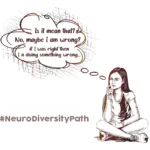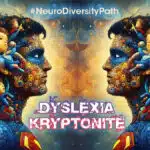Do you ever wonder what makes specific individuals stand out in a crowd? What if I told you that what some see as a challenge could actually be your greatest gift? In a world where attention is often fragmented, and focus seems fleeting, ADHD shines a light on a unique set of abilities and strengths. In this blog post, we’ll explore seven reasons ADHD is not just a disorder but a remarkable gift waiting to be unwrapped. Prepare to shift your perspective and discover the hidden treasures within ADHD. By the end of this post, you’ll gain a newfound appreciation for the power and potential that lies within you.

1. Embracing Uniqueness: The Power of ADHD
In a world that often values conformity, embracing ADHD’s uniqueness can be a game-changer. Research by Dr. Ned Hallowell, a leading expert on ADHD, highlights the distinct strengths associated with this neurodevelopmental condition. Rather than viewing ADHD as a limitation, recognizing it as a unique cognitive style can unlock immense potential.
Individuals with ADHD often display heightened creativity, hyperfocus, and out-of-the-box thinking—qualities that can be invaluable in areas like art, entrepreneurship, science, and technology. By reframing ADHD as a set of strengths, society can nurture the talents of neurodiverse individuals, enriching the collective tapestry of human experience.
Dr. Russell A. Barkley’s studies reveal that individuals with ADHD thrive in environments that stimulate their interests. Hyperfocus, one of the defining traits of ADHD, allows for intense concentration on tasks that captivate interest. This supercharged focus can lead to remarkable productivity and creativity, offering an alternative route to success for those who learn to harness it effectively.
2. Harnessing Hyperfocus: A Superpower of ADHD
Hyperfocus, often misunderstood as a distraction, is one of ADHD’s superpowers. When individuals with ADHD are passionate about a task, their ability to focus becomes laser-like, allowing them to dive deep and produce exceptional results. Dr. William Dodson, a psychiatrist specializing in ADHD, emphasizes the power of hyperfocus as a tool for achieving extraordinary outcomes.
By identifying tasks that align with personal interests and passions, individuals with ADHD can channel this energy into highly productive work. Studies conducted by Dr. Thomas E. Brown at Yale University suggest that individuals with ADHD perform at their best when engaged in activities they truly enjoy. Whether it’s an artistic project, a business endeavor, or a scientific challenge, hyperfocus can transform distraction into concentration, unlocking new realms of achievement.
Creating the right environment is also crucial. Designating a clutter-free workspace, reducing distractions, and establishing a structured routine can maximize the benefits of hyperfocus. By embracing and optimizing this trait, individuals with ADHD can accomplish extraordinary things.
3. Creativity Unleashed: ADHD as a Catalyst for Innovation
ADHD often fuels creativity, providing individuals with a fresh, out-of-the-box approach to solving problems. Dr. Shelley H. Carson, a Harvard psychologist, highlights the connection between ADHD and creativity, noting that individuals with ADHD often generate unconventional ideas and innovative solutions. The ability to think divergently sets those with ADHD apart, allowing them to approach challenges with unique insights.
Embracing curiosity and novelty plays a significant role in unleashing creativity. By cultivating a mindset of exploration, individuals with ADHD can tap into their natural creativity, leading to innovative thinking in various domains. Encouraging a supportive environment that celebrates experimentation can also amplify creativity, leading to breakthrough ideas and advancements.
Whether it’s in brainstorming sessions, artistic pursuits, or scientific research, individuals with ADHD bring fresh perspectives that drive innovation. By recognizing ADHD as a source of creativity, individuals can leverage their cognitive style to make meaningful contributions to the world.
4. Adaptive Thinking: Navigating Challenges with ADHD
Adaptive thinking is a valuable skill that allows individuals with ADHD to navigate life’s challenges with resilience and flexibility. Dr. Russell A. Barkley emphasizes the importance of developing adaptive strategies to manage ADHD symptoms and thrive in daily life. Rather than viewing setbacks as failures, individuals with ADHD can cultivate resilience and adaptability to overcome obstacles.
Mindfulness and self-awareness are crucial tools for fostering adaptive thinking. Dr. Lidia Zylowska at UCLA suggests that mindfulness-based interventions help improve attention, impulse control, and emotional regulation in individuals with ADHD. Practicing mindfulness allows a greater understanding of thoughts and behaviors, providing individuals with the tools to adapt and respond effectively to challenges.
Cultivating adaptability helps individuals with ADHD navigate complex situations with ease. Whether it’s managing time, adjusting to new environments, or overcoming personal obstacles, the ability to adapt enhances resilience and promotes long-term success.
5. Cultivating Resilience: Thriving with ADHD
Resilience is a key component of thriving with ADHD. Dr. Sam Goldstein, a clinical psychologist, emphasizes the importance of resilience in overcoming adversity and achieving success. Individuals with ADHD often face unique challenges, but by cultivating resilience, they can bounce back stronger from setbacks.
A growth mindset, as promoted by Dr. Carol S. Dweck, encourages individuals to view challenges as opportunities for personal growth. By reframing failures as learning experiences, individuals with ADHD can build resilience and remain motivated in the face of difficulties.
Seeking support from friends, family, and professionals is crucial in cultivating resilience. Research by Dr. Barkley highlights the importance of social support in promoting well-being for individuals with ADHD. A strong support network can offer encouragement, guidance, and perspective, helping individuals navigate life’s challenges with confidence and optimism.
6. Embracing Flexibility: ADHD as a Strength in Uncertain Times
Individuals with ADHD often excel in dynamic, fast-paced environments that require flexibility and quick thinking. In uncertain times, pivoting and adapting become powerful assets. Flexibility allows individuals with ADHD to easily navigate change, turning challenges into opportunities for growth and success.
This capacity for flexibility is not just about reacting to change but thriving in it. ADHD individuals often find success in fields that require innovation and adaptability, where their ability to shift gears quickly becomes a strength. By embracing this flexibility, individuals with ADHD can position themselves as problem solvers and innovators, capable of thriving in environments that demand rapid adaptation.
7. Building Strong Social Connections: ADHD’s Role in Empathy and Understanding
While ADHD is often associated with impulsivity, it also fosters empathy and deep social connections. Individuals with ADHD tend to be highly attuned to the emotions of others, often displaying a strong sense of empathy. This heightened emotional awareness can lead to meaningful relationships and a deep understanding of others’ needs.
Building strong social connections is not just a byproduct of ADHD but a strength individuals can leverage. Empathy allows for deeper, more meaningful relationships, both personally and professionally. By nurturing this trait, individuals with ADHD can become effective communicators, leaders, and collaborators, enhancing their ability to connect with and inspire those around them.
“In every adversity lies the seed of an equal or greater opportunity.”
– Napoleon Hill
ADHD is not just a disorder but a unique cognitive style filled with inherent strengths. From hyperfocus and creativity to adaptability and resilience, individuals with ADHD possess remarkable abilities that set them apart. By embracing these strengths, individuals can unlock their full potential and thrive in all aspects of life.
This journey of exploring ADHD’s hidden gifts challenges preconceived notions, revealing the extraordinary capabilities within each individual. Together, let’s continue to celebrate ADHD as a gift, recognizing the diversity of thought and perspective it brings to the world.
How has ADHD impacted your life, and what strategies have you found most helpful in leveraging its strengths? Share your thoughts below and join the conversation!





